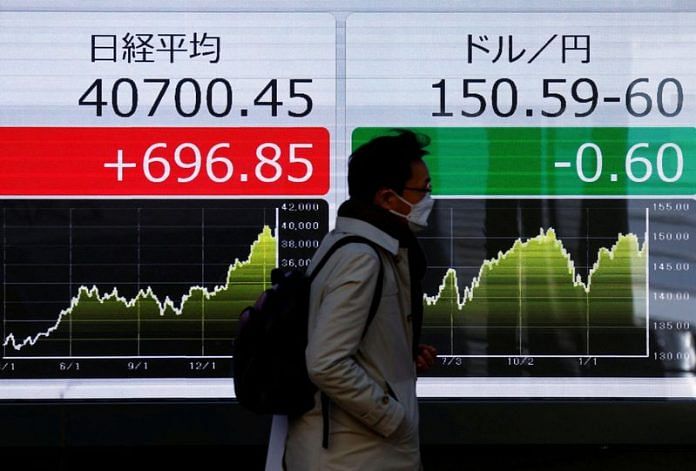By Jamie McGeever
(Reuters) – A look at the day ahead in Asian markets.
Monetary policy decisions in South Korea and Singapore, and Chinese trade and Indian inflation data top Asia’s calendar on Friday, as investors look to shake off the U.S. inflation-fueled volatility from the previous day and end the week on a high.
Currency markets remain on high alert for yen-supporting intervention from Japan, with the dollar holding above 153.00 yen at a 34-year high. Even if Tokyo doesn’t act, traders will be wary of staying ‘long’ dollar/yen at these historic levels going into the weekend.
The yen’s deep-rooted weakness – it is also at a 31-year low against the Chinese yuan – and the competitive advantage it seemingly offers Japan in world trade is bound to be causing unease across Asia.
It opens the possibility of an eventual ‘beggar thy neighbor’ wave of currency devaluations across the continent. This may never be official policy, but weaker exchange rates may be tacitly welcomed or encouraged in certain capitals.
Of course, weak exchange rates can complicate central banks’ fight against inflation. In China higher inflation would be welcome, but a weak and falling currency instead raises the potential for renewed capital flight out of Chinese assets.
And China’s currency is weak against the dollar. On Thursday it slipped to a five-month low despite the central bank’s efforts to steer it higher, and the offshore yuan had its steepest fall in three weeks.
On the equity front, meanwhile, Asian stocks can clock their best week in five if markets take heart from Wall Street’s remarkable rebound on Thursday, in particular the Nasdaq’s 1.7% jump.
A rise of 1% on the day will seal the MSCI Asia ex-Japan index’s best week this year and lift it to a new 14-month high.
The resilience of Asian stocks is all the more notable given the weakness in China. The blue chip CSI 300 index has fallen six days in a row, and another decline on Friday will mark the index’s worst run since the pandemic onset in March 2020.
A battered property sector, rising debt levels, and deflation remain heavy drags on economic activity, and the latest snapshot of consumer and producer prices will have done little to improve the outlook.
Beijing releases trade figures for March on Friday, with economists expecting exports to have contracted, cooling some of the optimism from earlier in the year.
South Korea’s central bank, meanwhile, is expected to keep its key policy rate unchanged at 3.50% for a 10th straight meeting on Friday, before embarking on a shallow cutting cycle next quarter, according to a Reuters poll.
And figures from India are expected to show inflation is expected to have eased to a five-month low of 4.91% in March, still well above the Reserve Bank of India’s 4% medium-term target.
Here are key developments that could provide more direction to markets on Friday:
– South Korea interest rate decision
– India consumer price inflation (March)
– China trade (March)
(By Jamie McGeever)
Disclaimer: This report is auto generated from the Reuters news service. ThePrint holds no responsibilty for its content.



